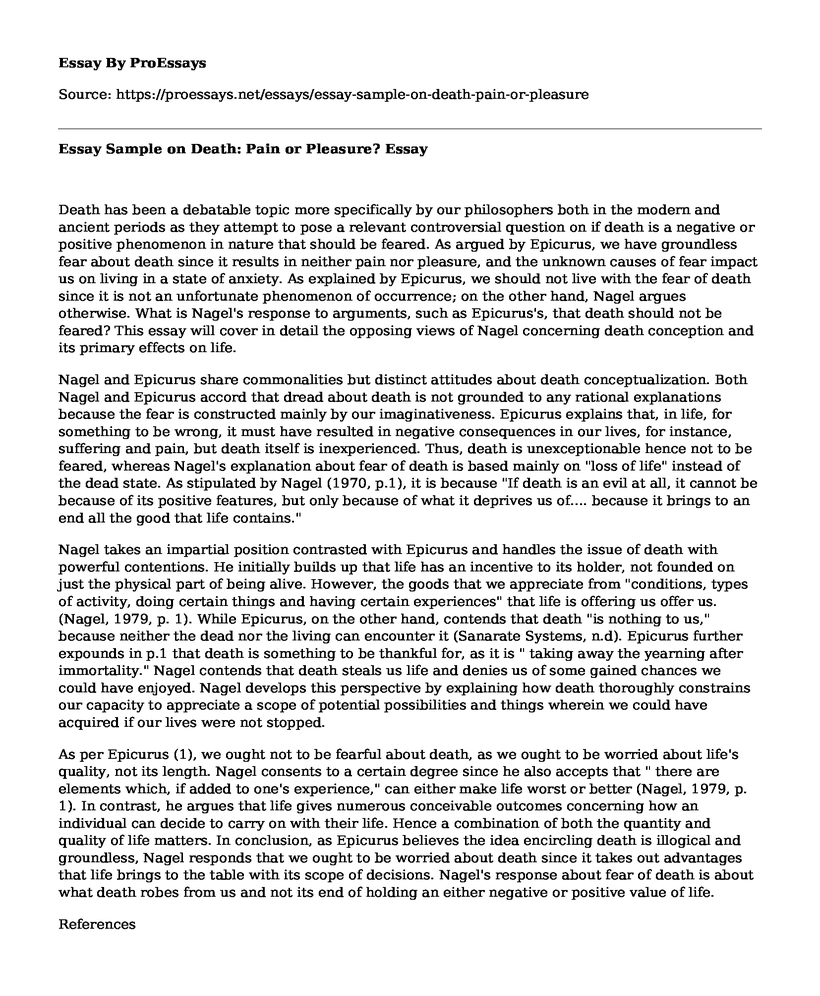Death has been a debatable topic more specifically by our philosophers both in the modern and ancient periods as they attempt to pose a relevant controversial question on if death is a negative or positive phenomenon in nature that should be feared. As argued by Epicurus, we have groundless fear about death since it results in neither pain nor pleasure, and the unknown causes of fear impact us on living in a state of anxiety. As explained by Epicurus, we should not live with the fear of death since it is not an unfortunate phenomenon of occurrence; on the other hand, Nagel argues otherwise. What is Nagel's response to arguments, such as Epicurus's, that death should not be feared? This essay will cover in detail the opposing views of Nagel concerning death conception and its primary effects on life.
Nagel and Epicurus share commonalities but distinct attitudes about death conceptualization. Both Nagel and Epicurus accord that dread about death is not grounded to any rational explanations because the fear is constructed mainly by our imaginativeness. Epicurus explains that, in life, for something to be wrong, it must have resulted in negative consequences in our lives, for instance, suffering and pain, but death itself is inexperienced. Thus, death is unexceptionable hence not to be feared, whereas Nagel's explanation about fear of death is based mainly on "loss of life" instead of the dead state. As stipulated by Nagel (1970, p.1), it is because "If death is an evil at all, it cannot be because of its positive features, but only because of what it deprives us of.... because it brings to an end all the good that life contains."
Nagel takes an impartial position contrasted with Epicurus and handles the issue of death with powerful contentions. He initially builds up that life has an incentive to its holder, not founded on just the physical part of being alive. However, the goods that we appreciate from "conditions, types of activity, doing certain things and having certain experiences" that life is offering us offer us. (Nagel, 1979, p. 1). While Epicurus, on the other hand, contends that death "is nothing to us," because neither the dead nor the living can encounter it (Sanarate Systems, n.d). Epicurus further expounds in p.1 that death is something to be thankful for, as it is " taking away the yearning after immortality." Nagel contends that death steals us life and denies us of some gained chances we could have enjoyed. Nagel develops this perspective by explaining how death thoroughly constrains our capacity to appreciate a scope of potential possibilities and things wherein we could have acquired if our lives were not stopped.
As per Epicurus (1), we ought not to be fearful about death, as we ought to be worried about life's quality, not its length. Nagel consents to a certain degree since he also accepts that " there are elements which, if added to one's experience," can either make life worst or better (Nagel, 1979, p. 1). In contrast, he argues that life gives numerous conceivable outcomes concerning how an individual can decide to carry on with their life. Hence a combination of both the quantity and quality of life matters. In conclusion, as Epicurus believes the idea encircling death is illogical and groundless, Nagel responds that we ought to be worried about death since it takes out advantages that life brings to the table with its scope of decisions. Nagel's response about fear of death is about what death robes from us and not its end of holding an either negative or positive value of life.
References
Nagel, T. (1970). Death. Nous, 73-80. Retrieved from; https://www.jstor.org/stable/2214297?seq=1.
Sanarate Systems. (n.d). "Letter to Menoeceus By Epicurus" from Letter to Menoeceus Translated by Robert Drew Hick. Retrieved from; http://sanarate.com/Literatura/classics/epicurus/letter_to_menoeceus.html.
Cite this page
Essay Sample on Death: Pain or Pleasure?. (2023, Mar 11). Retrieved from https://proessays.net/essays/essay-sample-on-death-pain-or-pleasure
If you are the original author of this essay and no longer wish to have it published on the ProEssays website, please click below to request its removal:
- The Compulsion Towards Conformity - Essay Example
- Annotated Bibliography on American Dream and Identity Issues
- Ethics in Organizational Decision-Making
- Features Make the Person I Am Essay
- Ethical Considerations for Adopting Electronic Records in Nursing Essay
- Essay Example on Tipping Etiquette: Customary or Non-Customary?
- Remembering Ethically: What Susan Sontag Taught Us - Essay Sample







